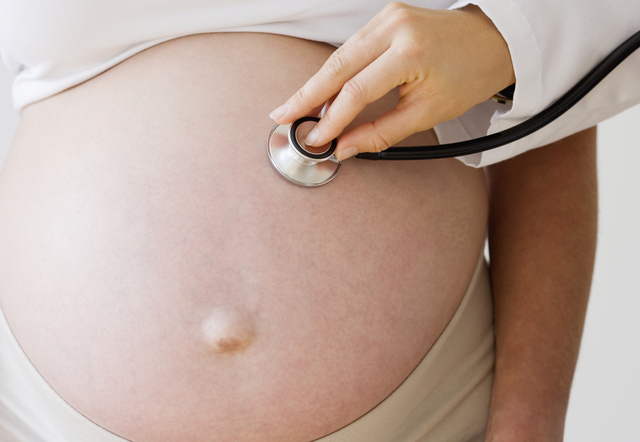A pregnancy involves various systems in a woman’s body, including the cardiovascular system. The involvement can cause changes such as high heart rate. But high heart rate during pregnancy is not always only due to the pregnancy. It could also be a symptom of an underlying medical condition. In case you experience shortness of breath, lightheadedness and anxiety during pregnancy, consult a doctor immediately.

Is It Normal to Have High Heart Rate in Pregnancy?
Increased heart rate during pregnancy reaching 100 BPM (beats per minute) or more is normal. Known as tachycardia, high heart rate needs not to cause panic if you are pregnant. Remember that another life is developing inside you and it depends on you to supply nourishment and oxygen. So your heart works a little harder.
As the pregnancy progresses, more blood goes to the fetus, with the uterus receiving 20 percent of pumped blood towards the end of the pregnancy. To keep your body and that of your growing baby well nourished, your heart pumps 30-50 percent more blood. This increased supply relies on your heart pumping harder, so that your normal resting heart rate of about 70 BPM rises to 80-90 BPM or higher during pregnancy.
Other Causes
High heart rate during pregnancy may also occur due to the following reasons:
- It is normal for an expectant mother to worry her baby’s and her own safety. She may also feel anxious about the whole responsibility of bearing another life within her. All these may lead to increased rate of heartbeat.
- The uterus expands to hold the growing fetus, increasing demand for blood.
- The breasts expand in readiness for milk production once the baby is born. The expanding tissues require blood supply for growth and maintenance.
- Conditions such as anemia and thyroid diseases can lead to a high heart rate in pregnancy.
- Other effects of pregnancy including increased weight and hormonal changes may also increase strain on the circulatory system and cause tachycardia.
- Smoking cigarettes, alcohol consumption and excess caffeine can lead to a rise in your heart rate.
How Fast the Heartbeat Will Be and When to Worry
- In the first trimester, your heartbeat may rise by 15-20 BPM.
- Once you get into the second trimester, there are increased dilation of arteries and relaxation of muscles, increasing the volume of blood in circulation. These changes cause a rise in heart rate by about 30 percent. The highest heart rate occurs within the 28th to 35th weeks.
- Following delivery of your baby, your heart’s output will decrease. The rate will be rapid at first, but slow down later and reach the pre-pregnancy level by around the 6th week following delivery.
Other additional symptoms that may also occur include:
- Shortness of breath or uneven breathing, irrespective of whether you are active or resting
- Racing or pounding pulse
- Palpitations and skipped heartbeats
- Lightheadedness, dizziness and fainting spells
- Coughing persistently
It is always important to consult your doctor in case you have any of the above symptoms. The doctor will examine you and carry out any necessary tests to find out how you and your developing baby are.
How to Cope with High Heart Rate in Pregnancy
Healthy Lifestyle
During pregnancy, your body is under a lot of stress and you may also be mentally stressed. It helps to slow down and let your body relax.
- Calm any emotional stresses and occasionally take a cup of chamomile tea. But take care not to drink too much.
- Some yoga positions, meditation and loving sex can also help you to calm down and reduce anxiety. But take care not to overindulge in sex when pregnant.
- You also need to get enough sleep.
Medication
While there are medications for high heart rate in pregnancy, this is not the best approach. Keep away from self-medication and if you feel like you may need medication, consult your doctor for assessment.
Remember that some medications such as amiodarone can cause abnormalities in your unborn baby. In some cases of sinus tachycardia, your doctor may prescribe calcium or beta channel blockers. However, supraventricular tachycardia in pregnancy usually doesn’t require treatment.
Other Mothers' Experience
You can also get help by reading about other mothers’ experiences.
“My heartbeat doubles from a normal of 60 beats to as high as 130 beats per minute. This gives me a light head. And yet my OB says this is normal. Increased blood flow is responsible. It helps to stay well hydrated by drinking lots of water.”
“My reading was 103 during the last appointment. Though it was too high, it did not need the medication. I had an occasional shortness of breath, but nothing serious in the chest. Talking to your doctor will calm you down.”
“I’ve had similar experiences with two pregnancies. It was a very hard work to even walk for short distances. My heart pounded and I had to sit down every few steps; otherwise I would tumble down or pass out. I went to a cardiologist and she diagnosed me with tachycardia due to pregnancy. I don’t normally suffer from any heart problem except when pregnant. The doctor prescribed some medications for high heart rate and they worked very well. The alternative would have been total bed rest.”
